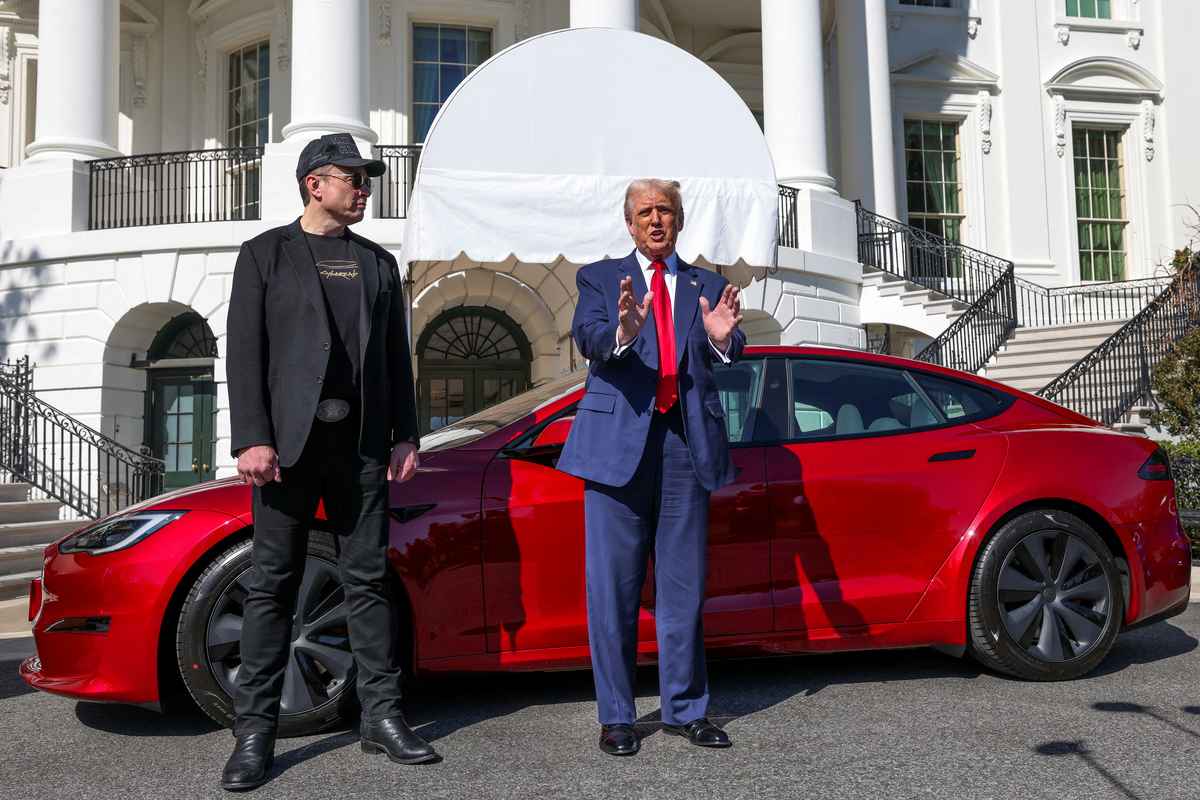
In a surprising turn of events, US President Donald Trump has softened his stance on Tesla CEO Elon Musk, signaling a potential reconciliation between the two after a heated online feud. Trump’s latest comments came during a White House event on June 12, 2025, when he acknowledged Tesla's role in the electric vehicle (EV) sector while simultaneously making a light-hearted remark about his continued preference for traditional combustion engines.
His statements followed a public apology from Musk, who had earlier criticized Trump’s policies in a series of social media posts.
The tensions between Trump and Musk escalated earlier this month, after the Tesla CEO launched an attack on Trump’s economic policies. Musk had described the president’s tax bill as a “disgusting abomination,” a comment that sent shockwaves through the political and business communities. Musk also made a suggestion that Trump should face impeachment, which further fueled the fire.

In response, Trump expressed “disappointment” in Musk’s comments, hinting at potential repercussions for Tesla and SpaceX’s government contracts. Trump’s remarks seemed to suggest that Musk’s outspoken criticism could jeopardize the billion-dollar deals Tesla and SpaceX have with the government, which have been pivotal in both companies’ growth.
However, Musk, known for his larger-than-life persona, did not back down immediately, intensifying the feud with a series of pointed social media posts.
Amid this growing public spat, Musk reached out to Trump via telephone and issued a public apology. On X (formerly Twitter), Musk wrote, “I regret some of my posts about President @realDonaldTrump last week. They went too far.”
This marked a rare instance of Musk expressing regret for his often controversial social media remarks. The apology was seen as a strategic attempt to repair the damage done to Musk’s relationship with the president, especially given the significant impact of their political and business ties.
During Thursday’s White House event, Trump seemed to soften his tone toward Musk. While discussing electric vehicles and his decision to revoke California's stringent EV mandates, Trump offered a somewhat surprising acknowledgment of Tesla’s role in the EV market. “A lot of people love the electric. They like Tesla. So do I. In all fairness, I like Tesla and I like others too, but I also like combustion engines,” he said.
Trump's comments came during a discussion on the rollback of California’s strict electric vehicle mandates, a move that aligns with Trump’s longstanding support for traditional energy sectors. His remark was a part of a broader political strategy aimed at rolling back environmental regulations, particularly those championed by California, a state known for its aggressive clean energy policies.
However, it was the personal reference to Musk that raised eyebrows. Trump continued, “But on my first day in office, I ended the Green New Scam and abolished the EV mandate at the federal level. We abolished it, which is basically that everybody would be driving an electric car within a very short period of time. Now I know why Elon doesn’t like me so much, which he does, actually, he does. And he never had a problem. You know, it’s very interesting. This is not something new. This has been there from day one, Speaker, right? We’re going to abolish the EV mandate. And Elon still endorsed me…”
These remarks were not just a casual mention of Musk’s apology; they were a reminder of the complex relationship between the two men. Trump’s statement that Musk “endorsed” him, despite the ongoing tensions, suggested that the president still viewed Musk as a potential ally, even though their political views on climate change and energy policy sharply diverged.
Trump’s comments regarding Tesla and Musk's apology came at a pivotal time for both men, especially in the context of their mutual business interests. Tesla, under Musk’s leadership, has become a key player in the electric vehicle market, and its growth has been buoyed by government incentives and support.
However, Musk’s vocal opposition to certain aspects of Trump’s environmental policies raised questions about the future of Tesla’s relationship with the federal government.
Tesla has been one of the largest beneficiaries of government subsidies aimed at promoting the development of clean energy technologies. These subsidies, along with contracts related to Tesla’s work with NASA and the U.S. military, have been crucial to the company’s financial success.
While Musk’s apology to Trump may help smooth over personal differences, it remains to be seen whether the billionaire CEO’s public remorse will have lasting effects on Tesla’s government dealings, especially as Trump continues to advocate for a rollback of climate regulations and a focus on traditional energy sources.
Trump’s acceptance of Musk’s apology could pave the way for a renewed collaboration between the two. However, the president’s simultaneous praise for combustion engines and his disavowal of strict EV mandates indicate that any partnership will be a complex balancing act. Tesla’s future in the U.S. market, as well as Musk’s broader ambitions in space exploration and renewable energy, may depend on his ability to navigate these shifting political dynamics.
Musk’s decision to apologize publicly was, in part, a strategic move aimed at stabilizing his personal and business relations with the president. Given the significant role that Tesla and SpaceX play in various government initiatives, Musk likely recognized that continued friction with Trump could have serious consequences for his companies. By issuing a public apology, Musk not only mended fences with a powerful political figure but also reassured investors and government officials that he was willing to put personal differences aside for the sake of business continuity.
This public display of regret also reflected Musk’s recognition that, despite his often brash and unapologetic approach to social media, there are times when a more conciliatory stance is necessary. The apology, though brief, marked a shift in Musk’s usual approach to conflict resolution, as he is typically more known for his defiance and willingness to engage in public feuds.
Musk’s apology also came at a time when his companies were under increasing scrutiny for their environmental impact. Tesla has faced criticism for its reliance on rare-earth minerals in the production of electric car batteries, while SpaceX’s space missions have raised questions about the environmental costs of space exploration.
Musk’s apology may, in part, be an effort to manage public perception of his companies and ensure that they continue to receive political and financial support.
Looking ahead, the future of Tesla, SpaceX, and Musk’s business empire in the U.S. will be influenced by the evolving relationship between Musk and Trump. While Trump has publicly stated his fondness for Tesla, his comments about combustion engines and his continued advocacy for traditional energy sources suggest that Musk’s companies may face challenges if the U.S. government moves away from clean energy policies.
It remains to be seen whether Musk’s apology will lead to a broader policy shift or if Tesla will continue to benefit from the government’s clean energy initiatives. As the U.S. government continues to grapple with climate change and energy policy, the intersection between Musk’s businesses and Trump’s political agenda will be a critical factor in shaping the future of the electric vehicle and space exploration industries.
Trump’s acceptance of Musk’s apology, while seemingly a step toward reconciliation, highlights the complexities of their relationship. Musk’s critical remarks about Trump’s economic policies were not easily forgotten, and while the apology may have temporarily eased tensions, the future of their political and business interactions remains uncertain.
The ongoing conflict between Musk’s vision for clean energy and Trump’s preference for traditional energy sources suggests that any long-term reconciliation between the two will require careful navigation. For now, Musk’s apology has helped to smooth over immediate tensions, but the true test of their relationship will come as the political and business landscapes continue to evolve.





-1750570235-q80.webp)
-1749482411-q80.webp)